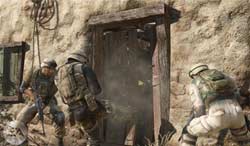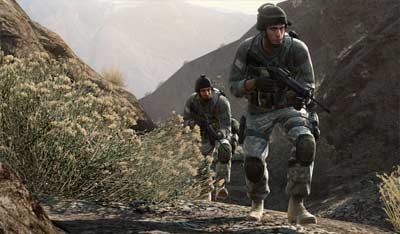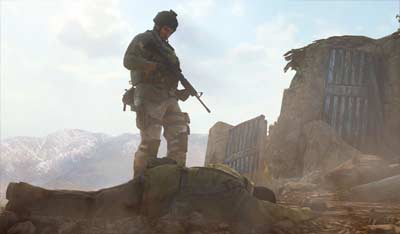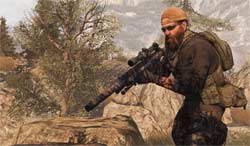Tango Down
There’s been a lot of hype and complication surrounding EA’s Afghanistan-based Medal of Honor reboot leading up to release. The game caught initial flack for allowing players to play as the Taliban in good-guys-vs.-bad-guys opposing force team matches. EA defense of the decision was fiercely unapologetic; in turn, the game lost some support, including from retailers on U.S. military bases.

Feeling the pressure, Danger Close then seemingly caved, removing any mention of the Taliban from multiplayer modes. Though the decision did not censor the Taliban’s presence in the game’s single-player campaign, the resultant free speech criticisms ripped open a freshly-sutured wound. Then there’s the setting itself: with Afghanistan as the backdrop, EA raised the stakes against the fictional, sci-fi-tinged battlefields of Modern Warfare, while skirting the issue of making perhaps too bold a statement against current military policy in the vein of the nebulous Iraq docu-game Six Days in Fallujah.
It’s in this no-man’s-land where Medal of Honor ultimately resides, somewhere between the shock-and-awe bombast of Activision’s cash cow and something a little more timely and relevant, a game that isn’t sure if it should tow the line or actually send some sort of politically relevant message. On the one hand, Danger Close has done an admirable job with the game’s campaign, which follows the U.S. Spec Ops teams as they grapple with a far more hostile deployment situation against Taliban forces than expected in the days following 9/11. Unlike Modern Warfare, the storyline is much more localized and ridiculous, and basically just runs these soldiers through the on-the-ground view of an increasingly worsening situation. If you’re looking for Michael Bay-style setpieces, you’re not going to find them here—one of the most refreshing things about Medal of Honor is that it seems fairly realistic, if perhaps a little adrenaline-heightened, in its terms of destruction or action-movie heroism (at least if you can look past the video game logic of the sheer number of enemies killed by an average soldier in any given situation here). You can’t go in guns blazing in every situation. Gathering intel on enemy movements, clearing out scattered hostile bases, and cooperating with air support to eliminate high priority targets make up a majority of the game’s mission objectives, making every step along the way feel somewhat grueling and part of a much larger process. There are still action-packed scenes in the game, but they’re far more grounded than your typical summer blockbuster. In other words, don’t expect your team to operate in a vaccum, or any EMPs-turning-D.C.-into-a-ravaged warzone-type situations.

On the other hand, since Medal of Honor’s campaign is typically less-Hollywoodized than Modern Warfare, Danger Close has (whether intentional or not) separated it from the Mountain Dew approach to war usually taken by video games. Even if the game still kowtows to fanboys of Call of Duty or other military shooters, underneath the gloss the message seems to run closer to political relevance than simply entertainment for entertainment’s sake. Unfortunately, this is where Medal of Honor falters somewhat, choosing mostly to push forward with the status quo. It’s admirable that the game is essentially a dedication to our fallen soldiers in battle, as well as a tribute to those who are out there risking their lives every day for our freedom. I have nothing but respect for this idea and these people. But stopping short of making any statement outside of patriotism, heroism, and sacrifice in the face of overwhelming and deadly odds is a misfire on EA’s part. Sadly, simply honoring courage and resolve glosses over the real issues, which makes Medal of Honor feel more like a game supporting the U.S. military but not a commentary on current military policy. We get tiny hints of less-than-noble policy here or there, with the top brass embodiment trying to push U.S. forces into Afghanistan as hard and fast as possible, or with the numerous times the soldiers on the ground remark just how much “intel f—ked us on this one.” But overall it’s a missed opportunity on EA’s part.

Given the developers’ insistence on setting Medal of Honor in Afghanistan to begin with, it becomes hard to disassociate yourself from this viewpoint. To Danger Close’s credit, the gameplay is solid and polished, with varied styles of play and top-notch production values, thanks to a heavily modified Unreal engine.

From a mechanical perspective, feels like a hybrid of Modern Warfare and EA’s own Battlefield: Bad Company series, though Danger Close has made a couple of tweaks that should be used in more FPSes. The first, leaning out of cover, has been used in PC-shooters for ages, but for some reason is rarely seen in console games (regardless, it’s invaluable). Medal of Honor’s campaign also uses a sprint-to-slide mechanic that lets you reach cover quickly and efficiently. Although both of these mechanics take some getting used to, once you’ve grown accustomed to them it will give you quite an edge in battle. I don’t generally make note of this, but the game’s environmental effects and level design are also worth mentioning. It’s surprisingly rare to find any FPS that actually incorporates sand and dust into attack strategy, but there are times in Medal of Honor where these natural elements are more than just atmospheric wisps only present to create texture within an environment, and can actually obscure your vision. Similarly, given that much of the Taliban forces are entrenched in mountainous regions, it should be noted that Danger Close has done a great job making your enemies hard to see when hiding among boulders on large ridgeback hills.
The amount of hard work and dedication that went into the creation of Medal of Honor is pretty evident. The game shines from a technical standpoint, and it plays as well as you would expect from high-polish production like this one. The limited vehicle use, arcade shooting, and stealth segments also help break up the pacing, so you don’t get too burnt out on simply shooting everything in sight for hours on end. Technically, these elements all make Medal of Honor a good game, but it’s still one that suffers to some degree from a lack of purpose. Paying tribute to our brave men and women in uniform—who often go through situations that are unimaginable to all of us sitting at home with controllers in our hands—is a great thing. The step that EA has taken towards establishing a precedent for exploring topical subject matter in a video game may be a small one, but it’s still important. But almost everything else about Medal of Honor, while enjoyable, makes it hard to shake the feeling of playing just another military shooter.
RATING OUT OF 5 RATING DESCRIPTION 4.5 Graphics
Medal of Honor is a good-looking game that runs at a steady clip. Of particular note are the game’s textures, lighting, and effects, though you may see an occasional animation glitch. 4.0 Control
It takes a little adjustment to get used to aiming and shooting (though this, along with the ability to go prone, are absent in DICE’s multiplayer), but once you do the control scheme works well. 3.5 Music / Sound FX / Voice Acting
Voicework is well done, though you’ll get lost in the endless military jargon that goes hand-in-hand with real spec ops. The soundtrack has some pretty stirring moments. 3.7 Play Value
Medal of Honor is a pretty good game, if one that wastes its topical potential throughout the six-to-eight hour single player campaign. The lack of the sprint slide and leaning aim in multiplayer create a slightly uneven feel, though the lack of Taliban names in multiplayer makes no difference whatsoever. 3.9 Overall Rating – Good
Not an average. See Rating legend above for a final score breakdown.
Game Features:
